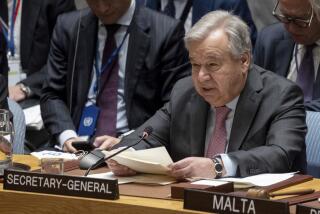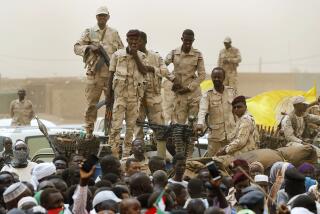U.S. Adding Sudan to Its Terrorist List
WASHINGTON — The Clinton Administration has decided to add Sudan, a fundamentalist Islamic state closely allied with Iran, to the list of nations accused of supporting terrorism, State Department officials said Tuesday.
The decision to place the impoverished nation, the largest in Africa, on the terrorist roster comes amid renewed reports that diplomats assigned to the Sudanese mission to the United Nations were implicated in a thwarted plot to bomb the United Nations and New York commuter tunnels.
However, State Department officials said that Secretary of State Warren Christopher based his decision entirely on evidence that Sudan has harbored and supported terrorist groups on its own soil, intentionally ignoring allegations of Sudanese involvement in the New York plot, apparently because that case is still before the courts.
“There is enough to put them on (the list) for what they are doing in Sudan,” said one official, who declined to be identified. He said that Christopher based the decision on evidence of Sudanese support for Islamic extremist groups such as Hamas and Hezbollah, both Iranian-backed organizations accused of terrorist attacks against Israel and secular Arab governments.
Nevertheless, the decision came after a government investigation of allegations that the Sudanese mission to the United Nations had cooperated with the terrorist suspects in the plot to bomb the United Nations. Federal agents had received information that members of the mission would supply the alleged terrorists with a vehicle bearing diplomatic plates as well as identification, so a bomb could be smuggled into the U.N. complex. Vehicles with such plates have had little difficulty entering the United Nations, even during the Persian Gulf War. Sudan’s U.N. ambassador, Ahmed Suliman, vehemently denied any role in the plot.
The FBI discovered the plot to blow up New York facilities and assassinate several officials, including U.N. Secretary General Boutros Boutros-Ghali, in June and arrested eight Muslim fundamentalists, including five Sudanese citizens.
A State Department official said that the government has no conclusive evidence linking the diplomats to the accused terrorists. A source close to the investigation agreed that the evidence is inconclusive, although he confirmed the accuracy of the transcript of a secretly recorded conversation--between a government informant and the alleged ringleader of the U.N. plot--that appears to implicate the diplomats.
“The brothers who are in the Sudanese Embassy, are they going to be with us?” informant Emad Salem says on the transcript, first reported by ABC.
“God willing, yes. . . . There is someone who is going to help me. High-level man,” replies Siddig Ibrahim Siddig Ali, the Sudanese citizen accused of being the leader of the terrorist group.
In Arabic, the language in which the conversation took place, the word inshallah , although normally translated “God willing,” often implies uncertainty or wishful thinking.
A State Department official said that the department began sifting evidence of Sudanese support for terrorism last December before the end of the George Bush Administration and long before the New York plot was uncovered.
U.S. law imposes broad trade sanctions against nations on the terrorist list, specifically banning the sale of weapons and other items with potential military uses and requiring cumbersome procedures for most other transactions. The direct impact on Sudan will be limited because the United States engaged in very little trade with the country even before the listing. But it is symbolically important.
Other countries on the list are Cuba, Iran, Iraq, Libya, North Korea and Syria. State Department officials said that formal action adding Sudan will be taken within the next few days. It will be the first time that Sudan has been placed on the list, which is changed infrequently.
In its annual report on international terrorism, issued last April, the department cited Sudan for “a disturbing pattern of relationships with international terrorist groups.” The report cited increasingly close ties between Sudan and Iran.
Sudanese leader Lt. Gen. Omar Hassan Ahmed Bashir has received military support from Iran and apparently has close ties to the Islamic government in Tehran.
More to Read
Sign up for Essential California
The most important California stories and recommendations in your inbox every morning.
You may occasionally receive promotional content from the Los Angeles Times.










